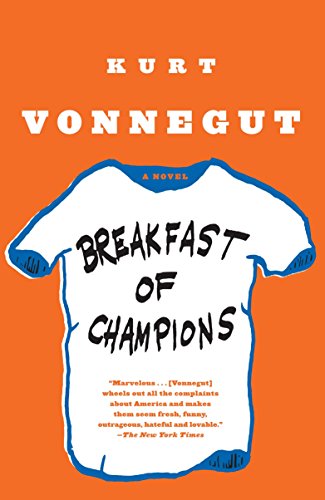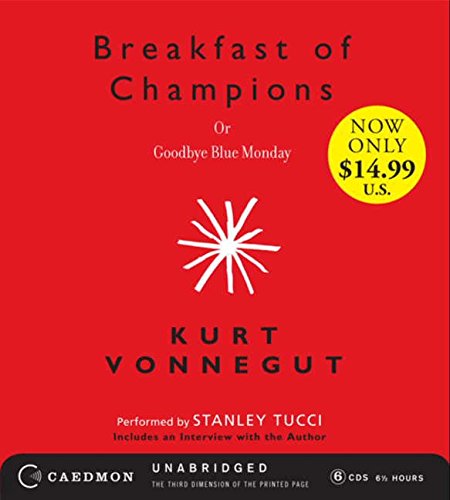-
Breakfast of Champions
Kurt Vonnegut, John Malkovich, Audible Studios
Audible Audiobook (Audible Studios, June 23, 2015)Audie Award Finalist, Best Male Narrator, 2016 Breakfast of Champions (1973) provides frantic, scattershot satire and a collage of Vonnegut's obsessions. His recurring cast of characters and American landscape was perhaps the most controversial of his canon; it was felt by many at the time to be a disappointing successor to Slaughterhouse-Five, which had made Vonnegut's literary reputation. The core of the novel is Kilgore Trout, a familiar character very deliberately modeled on the science fiction writer Theodore Sturgeon (1918-1985), a fact that Vonnegut conceded frequently in interviews and that was based upon his own occasional relationship with Sturgeon. Here Kilgore Trout is an itinerant wandering from one science fiction convention to another; he intersects with the protagonist, Dwayne Hoover (one of Vonnegut's typically boosterish, lost, and stupid mid-American characters), and their intersection is the excuse for the evocation of many others, familiar and unfamiliar, dredged from Vonnegut's gallery. The central issue is concerned with intersecting and apposite views of reality, and much of the narrative is filtered through Trout, who is neither certifiably insane nor a visionary writer but can pass for either depending upon Dwayne Hoover's (and Vonnegut's) view of the situation. America, when this novel was published, was in the throes of Nixon, Watergate, and the unraveling of our intervention in Vietnam; the nation was beginning to fragment ideologically and geographically, and Vonnegut sought to cram all of this dysfunction (and a goofy, desperate kind of hope, the irrational comfort given through the genre of science fiction) into a sprawling narrative whose sense, if any, is situational, not conceptual. Reviews were polarized; the novel was celebrated for its bizarre aspects and became the basis of a Bruce Willis movie adaptation whose reviews were not nearly so polarized. (Most critics hated it.)
-
Breakfast of Champions: A Novel
Kurt Vonnegut
Paperback (Dial Press Trade Paperback, May 11, 1999)“Marvelous . . . [Vonnegut] wheels out all the complaints about America and makes them seem fresh, funny, outrageous, hateful and lovable.”—The New York TimesIn Breakfast of Champions, one of Kurt Vonnegut’s most beloved characters, the aging writer Kilgore Trout, finds to his horror that a Midwest car dealer is taking his fiction as truth. What follows is murderously funny satire, as Vonnegut looks at war, sex, racism, success, politics, and pollution in America and reminds us how to see the truth.“Free-wheeling, wild and great . . . uniquely Vonnegut.”—Publishers Weekly
-
Breakfast Of Champions
Kurt Vonnegut, Jr. Vonnegut Kurt
eBook (Vintage Digital, Sept. 30, 2010)Discover Vonnegurt’s funny absurdist novel about the human condition. ‘Outrageous, witty, thought-provoking, unputdownable, scintillating, invigorating, ennobling, enlightening and masterly’ SpectatorIn a frolic of cartoon and comic outbursts against rule and reason, a miraculous weaving of science fiction, memoir, parable, fairy tale and farce, Kurt Vonnegut attacks the whole spectrum of American society, releasing some of his best-loved literary creations on the scene.‘Vonnegut explains everything from an apple to the pyramids…weird, fast and inventive’ Daily Telegraph
-
Breakfast of Champions
Kurt Jr Vonnegut
Mass Market Paperback (Dell Publishing, March 15, 1975)Clean, bright used copy with tight binding. NEVER a library book. LISTEDBY(KAD)
-
Breakfast of Champions
Kurt Vonnegut
Mass Market Paperback (Dell, Oct. 5, 1991)Breakfast Of Champions is vintage Vonnegut. One of his favorite characters, aging writer Kilgore Trout, finds to his horror that a Midwest car dealer is taking his fiction as truth. The result is murderously funny satire as Vonnegut looks at war, sex, racism, success, politics, and pollution in America and reminds us how to see the truth.
-
Breakfast of Champions
Kurt Vonnegut, John Malkovich
MP3 CD (Audible Studios on Brilliance Audio, Aug. 4, 2015)Breakfast of Champions (1973) provides frantic, scattershot satire and a collage of Vonnegut's obsessions. His recurring cast of characters and American landscape was perhaps the most controversial of his canon; it was felt by many at the time to be a disappointing successor to Slaughterhouse-Five, which had made Vonnegut's literary reputation.The core of the novel is Kilgore Trout, a familiar character very deliberately modeled on the science fiction writer Theodore Sturgeon (1918-1985), a fact that Vonnegut conceded frequently in interviews and that was based upon his own occasional relationship with Sturgeon. Here Kilgore Trout is an itinerant wandering from one science fiction convention to another; he intersects with the protagonist, Dwayne Hoover (one of Vonnegut's typically boosterish, lost, and stupid mid-American characters), and their intersection is the excuse for the evocation of many others, familiar and unfamiliar, dredged from Vonnegut's gallery. The central issue is concerned with intersecting and apposite views of reality, and much of the narrative is filtered through Trout, who is neither certifiably insane nor a visionary writer but can pass for either depending upon Dwayne Hoover's (and Vonnegut's) view of the situation.America, when this novel was published, was in the throes of Nixon, Watergate, and the unraveling of our intervention in Vietnam; the nation was beginning to fragment ideologically and geographically, and Vonnegut sought to cram all of this dysfunction (and a goofy, desperate kind of hope, the irrational comfort given through the genre of science fiction) into a sprawling narrative whose sense, if any, is situational, not conceptual. Reviews were polarized; the novel was celebrated for its bizarre aspects and became the basis of a Bruce Willis movie adaptation whose reviews were not nearly so polarized. (Most critics hated it.)
-
Breakfast Of Champions
Kurt Vonnegut
School & Library Binding (Turtleback Books, May 11, 1999)FOR USE IN SCHOOLS AND LIBRARIES ONLY. The author questions the condition of modern man in this novel, depicting a science fiction writer's struggle to find peace and sanity in the world.
-
Breakfast of Champions
Kurt Vonnegut
Hardcover (Delacorte Press/Seymour Lawrence, May 1, 1973)The author questions the condition of modern man in this novel depicting a science-fiction writer's struggle to find peace and sanity in the world
-
Breakfast of Champions: Or, Goodbye Blue Monday!
Jr. Vonnegut, Kurt
Paperback (Vintage Books, Jan. 1, 2009)In a frolic of cartoon and comic outbursts against rule and reason, a miraculous weaving of science fiction, memoir, parable, fairy tale and farce, Kurt Vonnegut attacks the whole spectrum of American society, releasing some of his best-loved literary creations on the scene.
-
Breakfast of Champions
Kurt Vonnegut
Hardcover (Cape, Jonathan, March 15, 1973)Breakfast of Champions is vintage Vonnegut. One of his favorite characters, aging writer Kilgore Trout, finds to his horror that a Midwest car dealer is taking his fiction as truth. The result is murderously funny satire as Vonnegut looks at war, sex, racism, success, politics, and pollution in America and reminds us how to see the truth.
-
Breakfast of Champions: A Novel
Kurt Vonnegut, John Malkovich
Audio CD (Audible Studios on Brilliance Audio, Aug. 4, 2015)Breakfast of Champions (1973) provides frantic, scattershot satire and a collage of Vonnegut's obsessions. His recurring cast of characters and American landscape was perhaps the most controversial of his canon; it was felt by many at the time to be a disappointing successor to Slaughterhouse-Five, which had made Vonnegut's literary reputation.The core of the novel is Kilgore Trout, a familiar character very deliberately modeled on the science fiction writer Theodore Sturgeon (1918-1985), a fact that Vonnegut conceded frequently in interviews and that was based upon his own occasional relationship with Sturgeon. Here Kilgore Trout is an itinerant wandering from one science fiction convention to another; he intersects with the protagonist, Dwayne Hoover (one of Vonnegut's typically boosterish, lost, and stupid mid-American characters), and their intersection is the excuse for the evocation of many others, familiar and unfamiliar, dredged from Vonnegut's gallery. The central issue is concerned with intersecting and apposite views of reality, and much of the narrative is filtered through Trout, who is neither certifiably insane nor a visionary writer but can pass for either depending upon Dwayne Hoover's (and Vonnegut's) view of the situation.America, when this novel was published, was in the throes of Nixon, Watergate, and the unraveling of our intervention in Vietnam; the nation was beginning to fragment ideologically and geographically, and Vonnegut sought to cram all of this dysfunction (and a goofy, desperate kind of hope, the irrational comfort given through the genre of science fiction) into a sprawling narrative whose sense, if any, is situational, not conceptual. Reviews were polarized; the novel was celebrated for its bizarre aspects and became the basis of a Bruce Willis movie adaptation whose reviews were not nearly so polarized. (Most critics hated it.)
-
Breakfast of Champions Low Price CD
Jr. Vonnegut, Kurt, Stanley Tucci
Audio CD (HarperAudio, Oct. 15, 2013)Kurt Vonnegut was a master of contemporary American literature. His black humor, satiric voice, and incomparable imagination first captured America's attention in The Sirens of Titan in 1959 and established him as "a true artist"* with Cat's Cradle in 1963. He was, as Graham Greene has declared, "one of the best living American writers."Breakfast of Champions is vintage Vonnegut. One of his favorite characters, aging writer Kilgore Trout, finds to his horror that a Midwest car dealer is taking his fiction as truth. The result is murderously funny satire as Vonnegut looks at war, sex, racism, success, politics, and pollution in America and reminds us how to see the truth.*The New York Times